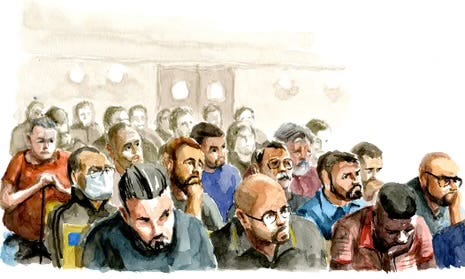A short post about the men who raped Gisèle Pelicot. (CW: sexual assault.)
What Dominique Pelicot and his peers seem to have in common.
I have been reading the accounts of the men who are charged with the sexual assault of Gisèle Pelicot, and there are two things that seem to recur across almost all of them: the implied self-exoneration, and the self-denial. Several of them may simply be saying these things to evade being found guilty, but it’s interesting to see which angles they think will work. There is the implied self-exoneration: “I have been through horrifying things as a child, which have naturally resulted in me carrying out this horrifying act”. There is the self-denial: “Rape is a thing done by bad men; I am not a bad man: therefore I did not commit the act of rape”.
These men are all well into adulthood but they often frame themselves as merely lost teenage boys: maybe because they think that will resonate, because even men who are grandfathers are not expected to make mature decisions, and because - worst of all - these horrors are something which our society should naturally expect of boys, and for which it should therefore forgive them. Our boys, us boys: permanently naive and innocent, forever capable of monstrous things, and never, ever accountable. This is never a degree of leniency that would be extended to girls or women of any age.
But I think that in their hearts these men know this. On one hand several of these men talk about having had no agency in the events that shaped them, but as adults they had no problem in acting as they did when an unconscious Pelicot had no agency to respond. That feels like the telling part: that male pain or even mere male resentment cannot be healed or addressed, it must be inflicted or redistributed elsewhere, and preferably towards girls and women. If there is a crisis of masculinity, then this is it, right here: that someone else has to suffer for my feelings of inadequacy as a man, and they must suffer terribly, because that is the only way that I will purge them.
Yesterday Pelicot said “when you’re raped there is shame, and it’s not for us to have shame, it’s for them”: and it does seem as if the testimonies of these men, evasive as they are, do reveal shame at the very deliberate choices they have made. That’s because not one of them can admit to the entirety of what they have done: the contemplation, the cruel calculation. And for Pelicot to show these men to the world, and to themselves, as they truly are, that is huge progress. I think that shame over their rapes is something that men perhaps flee faster than anything else in their lives. Many would rather die before confronting it.
I have seen several men continue to live their lives without any adverse consequences while the spirits of the women they raped were left diminished if not shattered altogether. Those men, broken in other ways, have probably gone on to perform rite after rite of social respectability since then - finding a wife here, raising a daughter there - but the shame remains. Maybe, in the new tribes they have now found, they still pretend to boast about it to each other in their WhatsApp groups. But if they were truly proud of it, they would boast about it to the women who love them most.
There will be focus on the fact that many of those who assaulted Pelicot were assaulted themselves as children. It should not need saying, but sympathy for their suffering then should not affect their accountability now - especially since many of those who went through similar nightmares as children have successfully fought for a better world as adults, and have become the opposite of the men who raped Pelicot. It is also important to remember that not all of these men accused were abused as children: that the one thing that all these men have in common is that they assaulted Pelicot because they had the opportunity to do so. That is the crucial and unavoidable reality. They did it because they could.
There are no words for the devastating loss that Gisèle Pelicot has suffered. Fifty years of love and trust have not only evaporated but been replaced by something so sinister that many people’s instinct is to look away from it, to pretend that this can happen not only in a village in the south of France that it can happen anywhere else - that some version of this is happening somewhere else, right now. But Pelicot never looked away from it, not once. What an extraordinary person she is - not a superhuman, but something even better: fully human.
Pelicot also told the court: “I am a woman who is totally destroyed, and I don’t know how I’m going to rebuild myself. I’m 72 soon and I’m not sure my life will be long enough to recover from this”. I hope that every single one of her days from now on is filled with love, tenderness, and friendship. What an astonishing gift she has given to countless girls and women: and, hopefully, to herself.




